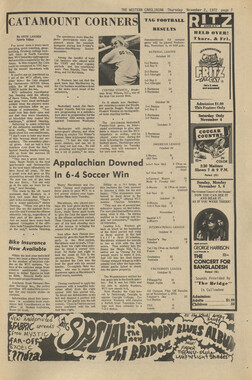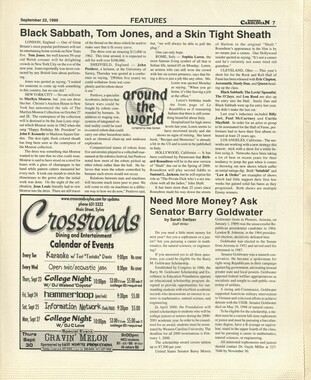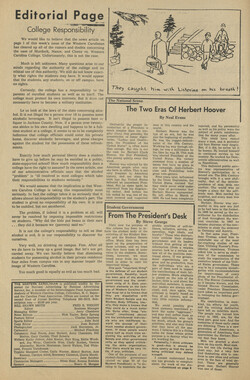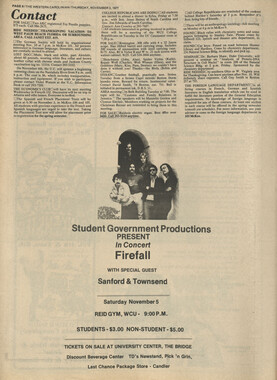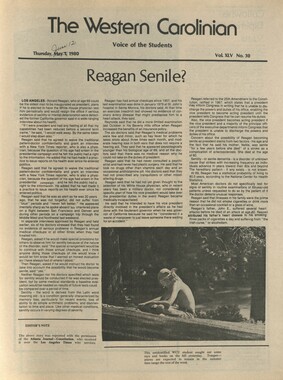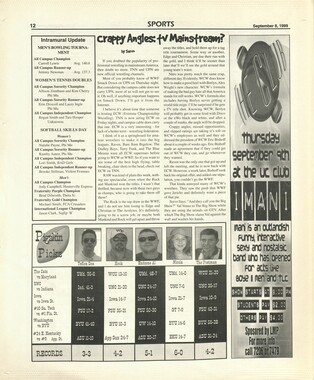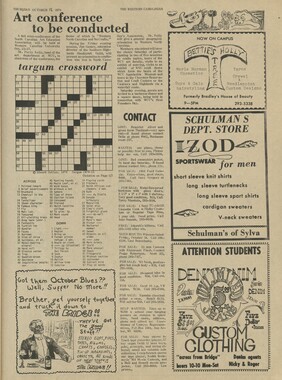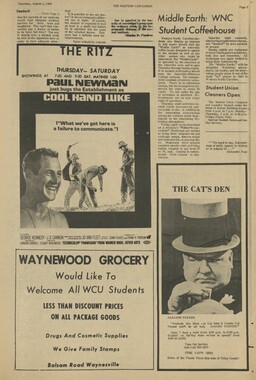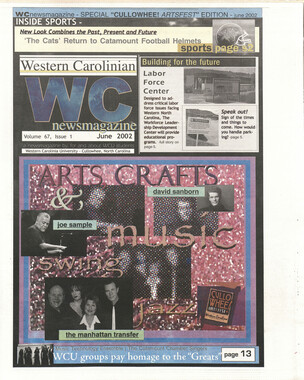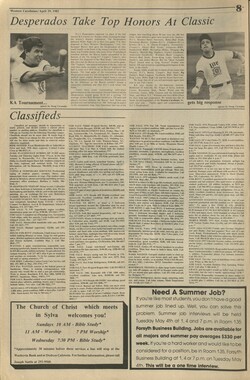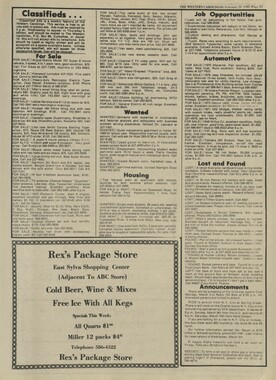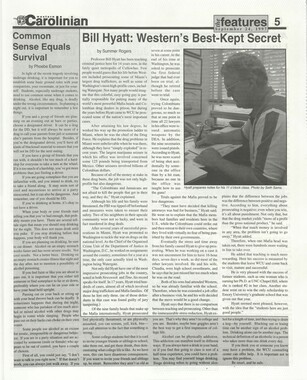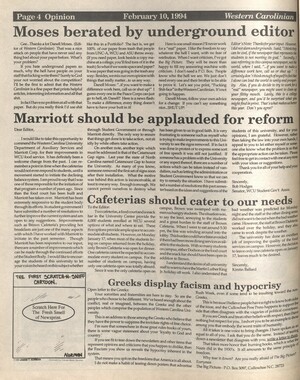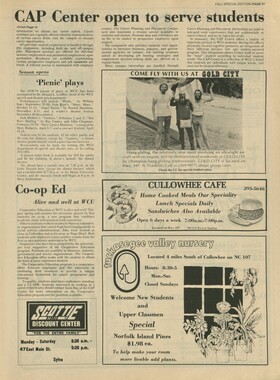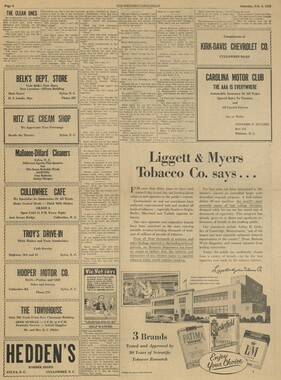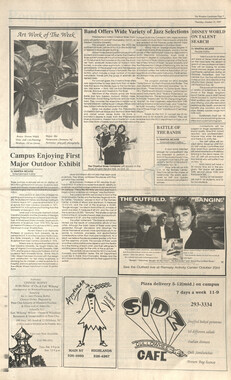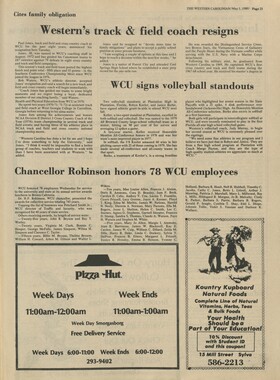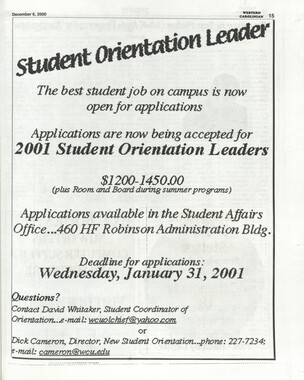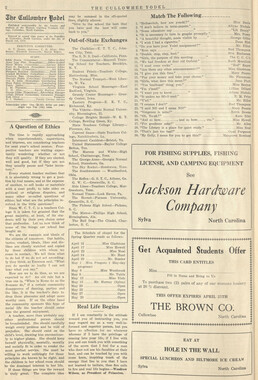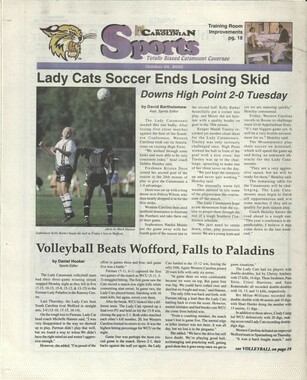Western Carolina University (21)
View all
- Canton Champion Fibre Company (2308)
- Cherokee Traditions (291)
- Civil War in Southern Appalachia (165)
- Craft Revival (1942)
- George Masa Collection (137)
- Great Smoky Mountains - A Park for America (3080)
- Highlights from Western Carolina University (422)
- Horace Kephart (998)
- Journeys Through Jackson (159)
- LGBTQIA+ Archive of Jackson County (89)
- Oral Histories of Western North Carolina (318)
- Picturing Appalachia (6617)
- Stories of Mountain Folk (413)
- Travel Western North Carolina (153)
- Western Carolina University Fine Art Museum Vitreograph Collection (129)
- Western Carolina University Herbarium (92)
- Western Carolina University: Making Memories (738)
- Western Carolina University Publications (2491)
- Western Carolina University Restricted Electronic Theses and Dissertations (146)
- Western North Carolina Regional Maps (71)
- World War II in Southern Appalachia (131)
University of North Carolina Asheville (6)
View all
- Allanstand Cottage Industries (62)
- Appalachian National Park Association (53)
- Bennett, Kelly, 1890-1974 (1463)
- Berry, Walter (76)
- Brasstown Carvers (40)
- Carver, George Washington, 1864?-1943 (26)
- Cathey, Joseph, 1803-1874 (1)
- Champion Fibre Company (233)
- Champion Paper and Fibre Company (297)
- Cherokee Indian Fair Association (16)
- Cherokee Language Program (22)
- Crowe, Amanda (40)
- Edmonston, Thomas Benton, 1842-1907 (7)
- Ensley, A. L. (Abraham Lincoln), 1865-1948 (275)
- Fromer, Irving Rhodes, 1913-1994 (70)
- George Butz (BFS 1907) (46)
- Goodrich, Frances Louisa (120)
- Grant, George Alexander, 1891-1964 (96)
- Heard, Marian Gladys (60)
- Kephart, Calvin, 1883-1969 (15)
- Kephart, Horace, 1862-1931 (313)
- Kephart, Laura, 1862-1954 (91)
- Laney, Gideon Thomas, 1889-1976 (439)
- Masa, George, 1881-1933 (61)
- McElhinney, William Julian, 1896-1953 (44)
- Niggli, Josephina, 1910-1983 (10)
- North Carolina Park Commission (105)
- Osborne, Kezia Stradley (9)
- Owens, Samuel Robert, 1918-1995 (11)
- Penland Weavers and Potters (36)
- Roberts, Vivienne (15)
- Roth, Albert, 1890-1974 (142)
- Schenck, Carl Alwin, 1868-1955 (1)
- Sherrill's Photography Studio (2565)
- Southern Highland Handicraft Guild (127)
- Southern Highlanders, Inc. (71)
- Stalcup, Jesse Bryson (46)
- Stearns, I. K. (213)
- Thompson, James Edward, 1880-1976 (226)
- United States. Indian Arts and Crafts Board (130)
- USFS (683)
- Vance, Zebulon Baird, 1830-1894 (1)
- Weaver, Zebulon, 1872-1948 (58)
- Western Carolina College (230)
- Western Carolina Teachers College (282)
- Western Carolina University (2008)
- Western Carolina University. Mountain Heritage Center (18)
- Whitman, Walt, 1819-1892 (10)
- Wilburn, Hiram Coleman, 1880-1967 (73)
- Williams, Isadora (3)
- Cain, Doreyl Ammons (0)
- Crittenden, Lorraine (0)
- Rhodes, Judy (0)
- Smith, Edward Clark (0)
- Appalachian Region, Southern (3032)
- Asheville (N.C.) (1945)
- Avery County (N.C.) (26)
- Blount County (Tenn.) (195)
- Buncombe County (N.C.) (1680)
- Cherokee County (N.C.) (283)
- Clay County (N.C.) (556)
- Graham County (N.C.) (238)
- Great Smoky Mountains National Park (N.C. and Tenn.) (535)
- Haywood County (N.C.) (3573)
- Henderson County (N.C.) (70)
- Jackson County (N.C.) (4925)
- Knox County (Tenn.) (35)
- Knoxville (Tenn.) (13)
- Lake Santeetlah (N.C.) (10)
- Macon County (N.C.) (421)
- Madison County (N.C.) (216)
- McDowell County (N.C.) (39)
- Mitchell County (N.C.) (135)
- Polk County (N.C.) (35)
- Qualla Boundary (982)
- Rutherford County (N.C.) (78)
- Swain County (N.C.) (2185)
- Transylvania County (N.C.) (270)
- Watauga County (N.C.) (12)
- Waynesville (N.C.) (86)
- Yancey County (N.C.) (72)
- Aerial Photographs (3)
- Aerial Views (60)
- Albums (books) (4)
- Articles (1)
- Artifacts (object Genre) (228)
- Bibliographies (1)
- Biography (general Genre) (2)
- Cards (information Artifacts) (38)
- Clippings (information Artifacts) (193)
- Copybooks (instructional Materials) (3)
- Crafts (art Genres) (622)
- Depictions (visual Works) (21)
- Design Drawings (1)
- Digital Moving Image Formats (2)
- Drawings (visual Works) (185)
- Envelopes (115)
- Exhibitions (events) (1)
- Facsimiles (reproductions) (1)
- Fiction (general Genre) (4)
- Financial Records (12)
- Fliers (printed Matter) (67)
- Glass Plate Negatives (381)
- Guidebooks (2)
- Internegatives (10)
- Interviews (823)
- Land Surveys (102)
- Letters (correspondence) (1070)
- Manuscripts (documents) (618)
- Maps (documents) (177)
- Memorandums (25)
- Minutes (administrative Records) (59)
- Negatives (photographs) (6090)
- Newsletters (1290)
- Newspapers (2)
- Notebooks (8)
- Occupation Currency (1)
- Paintings (visual Works) (1)
- Pen And Ink Drawings (1)
- Periodicals (194)
- Personal Narratives (10)
- Photographs (12977)
- Plans (maps) (1)
- Poetry (6)
- Portraits (4568)
- Postcards (329)
- Programs (documents) (181)
- Publications (documents) (2444)
- Questionnaires (65)
- Relief Prints (26)
- Sayings (literary Genre) (1)
- Scrapbooks (282)
- Sheet Music (2)
- Slides (photographs) (402)
- Songs (musical Compositions) (2)
- Sound Recordings (802)
- Specimens (92)
- Speeches (documents) (18)
- Tintypes (photographs) (8)
- Transcripts (329)
- Text Messages (0)
- A.L. Ensley Collection (275)
- Appalachian Industrial School Records (7)
- Appalachian National Park Association Records (336)
- Axley-Meroney Collection (2)
- Bayard Wootten Photograph Collection (20)
- Bethel Rural Community Organization Collection (7)
- Blumer Collection (5)
- C.W. Slagle Collection (20)
- Canton Area Historical Museum (2110)
- Carlos C. Campbell Collection (462)
- Cataloochee History Project (64)
- Cherokee Studies Collection (4)
- Daisy Dame Photograph Album (5)
- Daniel Boone VI Collection (1)
- Doris Ulmann Photograph Collection (112)
- Elizabeth H. Lasley Collection (1)
- Elizabeth Woolworth Szold Fleharty Collection (4)
- Frank Fry Collection (95)
- George Masa Collection (173)
- Gideon Laney Collection (452)
- Hazel Scarborough Collection (2)
- Hiram C. Wilburn Papers (28)
- Historic Photographs Collection (236)
- Horace Kephart Collection (861)
- Humbard Collection (33)
- Hunter and Weaver Families Collection (1)
- I. D. Blumenthal Collection (4)
- Isadora Williams Collection (4)
- Jesse Bryson Stalcup Collection (47)
- Jim Thompson Collection (224)
- John B. Battle Collection (7)
- John C. Campbell Folk School Records (80)
- John Parris Collection (6)
- Judaculla Rock project (2)
- Kelly Bennett Collection (1482)
- Love Family Papers (11)
- Major Wiley Parris Civil War Letters (3)
- Map Collection (12)
- McFee-Misemer Civil War Letters (34)
- Mountain Heritage Center Collection (4)
- Norburn - Robertson - Thomson Families Collection (44)
- Pauline Hood Collection (7)
- Pre-Guild Collection (2)
- Qualla Arts and Crafts Mutual Collection (12)
- R.A. Romanes Collection (681)
- Rosser H. Taylor Collection (1)
- Samuel Robert Owens Collection (94)
- Sara Madison Collection (144)
- Sherrill Studio Photo Collection (2558)
- Smoky Mountains Hiking Club Collection (616)
- Stories of Mountain Folk - Radio Programs (374)
- The Reporter, Western Carolina University (510)
- Venoy and Elizabeth Reed Collection (16)
- WCU Gender and Sexuality Oral History Project (36)
- WCU Mountain Heritage Center Oral Histories (25)
- WCU Oral History Collection - Mountain People, Mountain Lives (71)
- WCU Students Newspapers Collection (1923)
- Western North Carolina Tomorrow Black Oral History Project (69)
- William Williams Stringfield Collection (2)
- Zebulon Weaver Collection (109)
- African Americans (390)
- Appalachian Trail (35)
- Artisans (521)
- Cherokee art (84)
- Cherokee artists -- North Carolina (10)
- Cherokee language (21)
- Cherokee pottery (101)
- Cherokee women (208)
- Church buildings (190)
- Civilian Conservation Corps (U.S.) (111)
- College student newspapers and periodicals (2012)
- Dams (108)
- Dance (1023)
- Education (222)
- Floods (63)
- Folk music (1015)
- Forced removal, 1813-1903 (2)
- Forest conservation (220)
- Forests and forestry (1198)
- Gender nonconformity (4)
- Great Smoky Mountains National Park (N.C. and Tenn.) (181)
- Hunting (47)
- Landscape photography (25)
- Logging (122)
- Maps (83)
- Mines and mineral resources (9)
- North Carolina -- Maps (18)
- Paper industry (38)
- Postcards (255)
- Pottery (135)
- Railroad trains (72)
- Rural electrification -- North Carolina, Western (3)
- School integration -- Southern States (2)
- Segregation -- North Carolina, Western (5)
- Slavery (5)
- Sports (452)
- Storytelling (243)
- Waterfalls -- Great Smoky Mountains (N.C. and Tenn.) (66)
- Weaving -- Appalachian Region, Southern (280)
- Wood-carving -- Appalachian Region, Southern (328)
- World War, 1939-1945 (174)
Western Carolinian Volume 68 Number 10
Item
Item’s are ‘child’ level descriptions to ‘parent’ objects, (e.g. one page of a whole book).
-
-
Mountain Folklore Series Wrapping Up April 7 By Aaron Holmes. | WC The Mountain Folklore Series will be wrapping up on April 7 at 7:30 P.M. in the auditorium of the Mountain Heritage Center with a talk by Phil Noblitt, management assistant for the Blue Ridge Parkway and author of Mansion in the Mountains, The series, organized by Dr. Phillip Coyle, an assistant professor in Anthropology & Sociology, focuses on mountain culture and moves from storytelling to music to the representation of mountain culture. Folklore is face-to-face culture, explains Coyle. So, folklore performances are face-to-face performances. Coyle says that the main difference between a television or theatrical performance and a folklore performance is the extremely intimate nature of the folklore experience. Folklore is more about treating each other like human beings, Coyle says. The audience relates directly to the speaker. Coyle organized the series to allow attendees to see a progression in subject matter. Theres a logic to the whole thing. It started with stories, then we talked about ballads, then we talked about fiddles. Moving from storytelling to music, guests such as Bill Carson, a storyteller from Altapass, and Reggie Harris, part of the Harris Brothers and a Blues Music scholar, performed for the series. Coyle is interested in showing how mountain culture has been shaped and molded, often in ways many people dont realize. He points out how mountain music has roots in African American history. Black people have a huge influence on mountain music, he asserts. The banjo, fundamental to bluegrass, came from Africa. Much of what is thought to be traditional mountain music has been shaped by the blues. The series is also a part of an Anthropology 466 class. Because of its intimate atmosphere, the series works as a memorable learning experience. Being memorable is important to Coyle. He explains that it is usually hard to remember a specific day of a specific class. Think back to your sophomore year. Can you remember what happened in just one specific class? Coyle asks, My students will not forget these classes, he asserts. Coyle works to make sure that the events in the series will stand out in the minds of those who attend them. On March 3, Eric Mrozkowski, band director at Smoky Mountain High School, and Barry Boyland, a professional drum maker, performed and talked about African drumming. We had drums for everyone in the audience, Coyle said. The attendees were taught basic rhythms and included in the drumming routine. This sort of participation allows participants to experience the subject matter first hand. The last session of the series focuses on the representation of mountain culture. Noblitt, the speaker, is critical of how most people and institutions treat mountain heritage. As Coyle explains, most people tend to think of mountain people as settlers or primitive. He alludes to popular ideas about mountain culture shaped by movies such as Deliverance. Such views, says Coyle, dont do justice to a culture that has been established and growing for around 200 years. Noblitt will go deeper into this theme during his talk, which, like the rest of the series, is free of charge and open to the public. Radio Promo Wins First Place Award A radio promotional announcement produced by. a Western Carolina University student has won national recognition from the Broadcast Education Association. Will Candler, a junior majoring in electronic media and General Manager of Power 90.5, won first place in the public service announcement/commercial category in the associations Festival of Media Arts. The competion is held each year at the annual convention in Las Vegas just before the National Association of Broadcasters Convention. There were more than 600 entries in the category won by Candler, a 1999 graduate of T.C. Roberson High School and son of Bill Candler of Arden. The promo also won Best of Festival/ King Foundation Award for best overall entry in any audio category, ranging from news and sports to public affairs. The award will be presented at the BEA/ National Association of Broadcasters meeting in Las Vegas in April. The announcement Candler produced, Distraction, airs on WWCU Power 90.5, the university _ radio station. Ten WCU communication students are attending this years convention along with Western faculty members. The BEA is the professional association for professors, industry professionals and graduate students who are interested in teaching and research related to electronic media and multimedia enterprises. To listen to the award-winning spot, visit http: / /Www.wcu.edu/pubinfo/news/distraction.mp3. | Nessie spotted at WCU : No, not the Loch Ness monster, but the National _ Survey of Student Engagement (NSSE) has hit our _ Campus and several hundred other colleges and _ universities across the country. While it's easy toignore _ Surveys, this one is short and has the potential to actually _ make a difference in the quality of undergraduate _ education here and elsewhere. It asks the kinds of _ questions that matter to student learning and institutional _ effectiveness such as: ie How much reading and writing is required? e How often do students interact with other students. _ who are from different backgrounds and cultures? How good is the academic advising? e How many students work with faculty members on _fesearch and other activities? == In order to improve teaching, learning and student life, Western is interested in knowing how and where Students spend their time, the nature and quality of their interactions with faculty members and peers, and what _ they have gained from their classes and ther aspects of their college experience. Western can use student responses to these questions to impro' teaching and _ learning, as well as various areas of campus life. The survey is anonymous and takes less than 15 minutes to complete. Students can use either web-based or paper forms to fill out the questionnaire. Changes can only be made if the randomly selected students participate. If you have been contacted to take the survey, please complete the paper survey and send it back in the postage-paid envelope. The NSSE project is co-sponsored by The Carnegie Foundation for the Advancement of Teaching and the Pew Forum on Undergraduate Learning. It is administered by the Center for Survey Research at Indiana University and is supported in part by a grant from Lumina Foundation for Education. _ Additional information about The National Survey _ of Student Engagement (NSSE) is available on the web (http://www.iub.edu/~nsse/) or through Renee Corbin in Westerns Office of University Planning. She can be reached by phone at 828-227-7239 or by email at corbin@email.wcu.edu.
Object
Object’s are ‘parent’ level descriptions to ‘children’ items, (e.g. a book with pages).
-
The Western Carolinian is Western Carolina University's student-run newspaper. The paper was published as the Cullowhee Yodel from 1924 to 1931 before changing its name to The Western Carolinian in 1933.
-
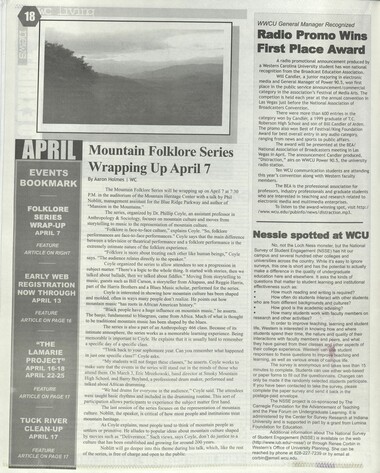

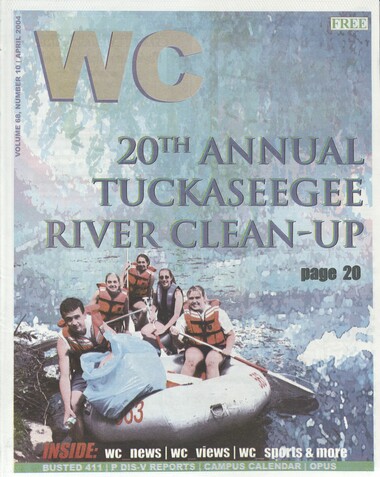
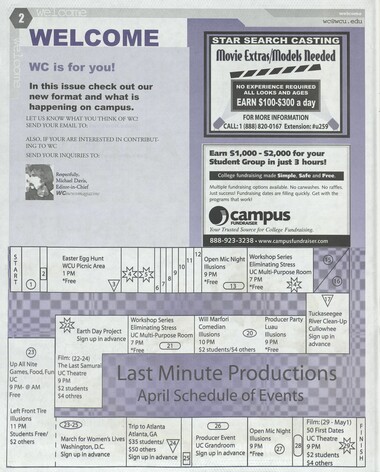





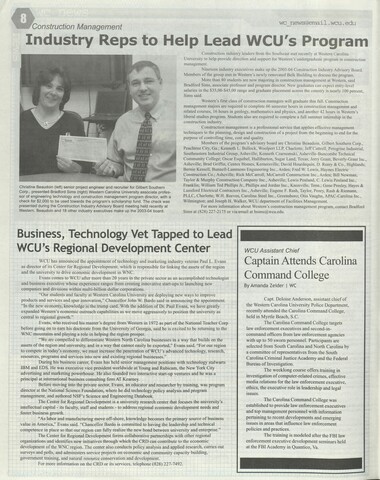
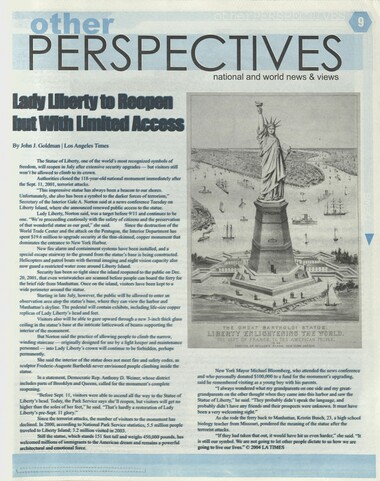
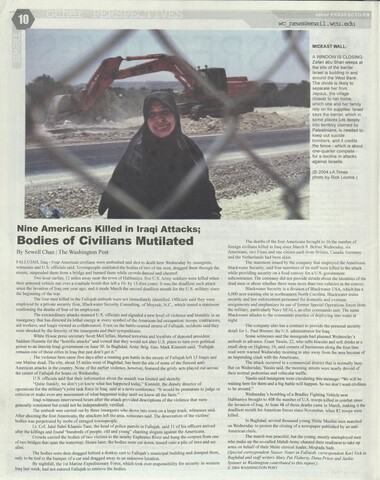
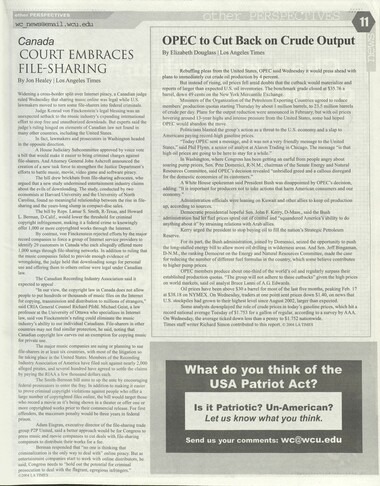
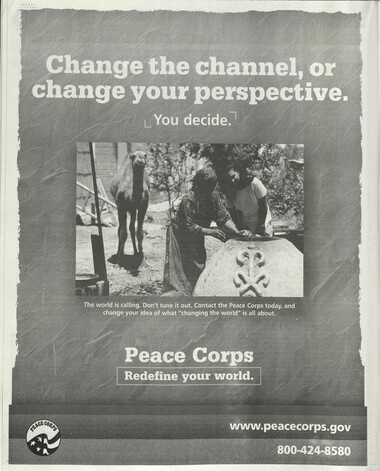
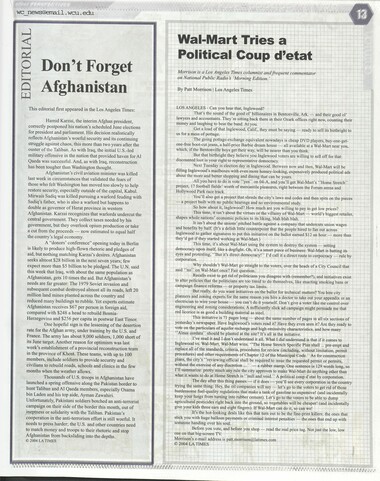

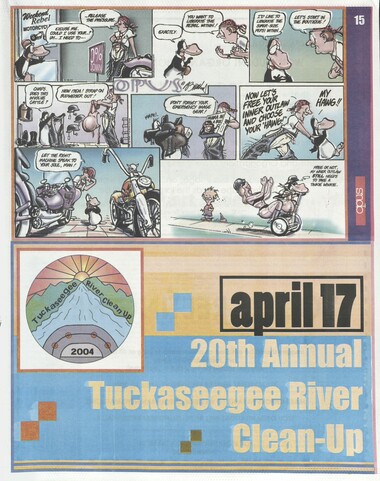

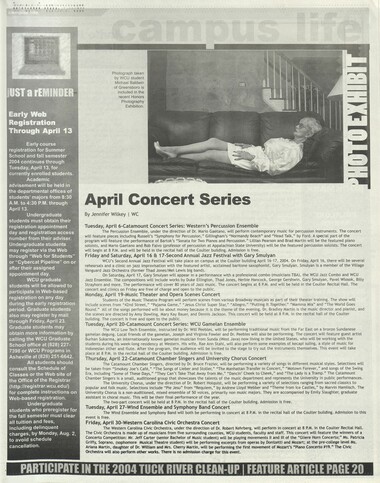



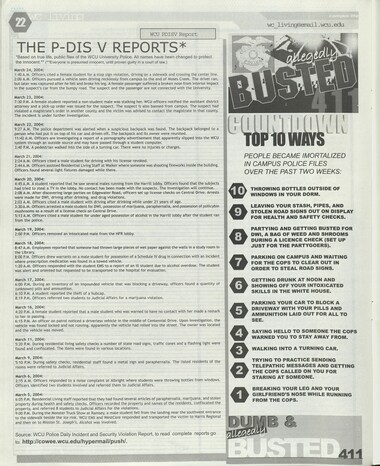
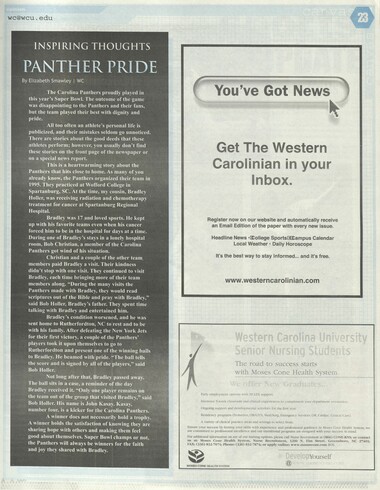
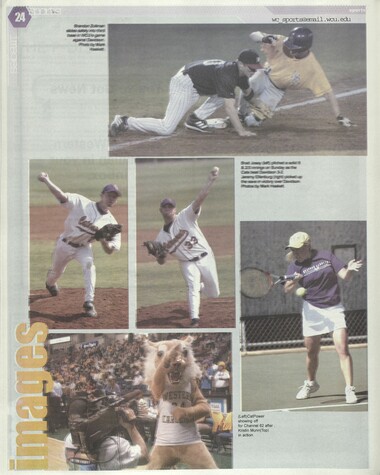
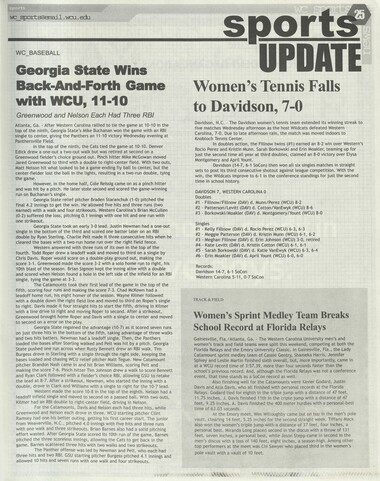
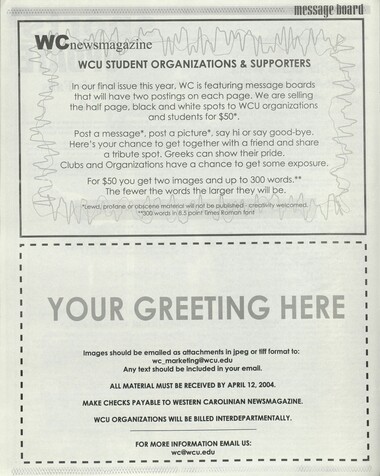
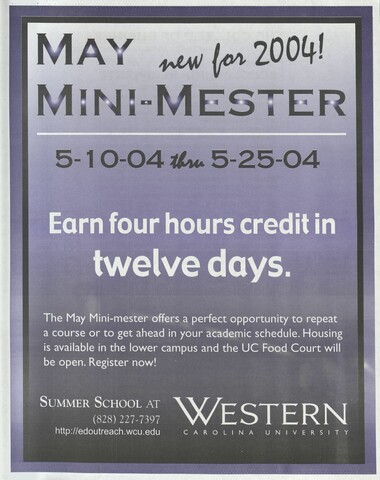
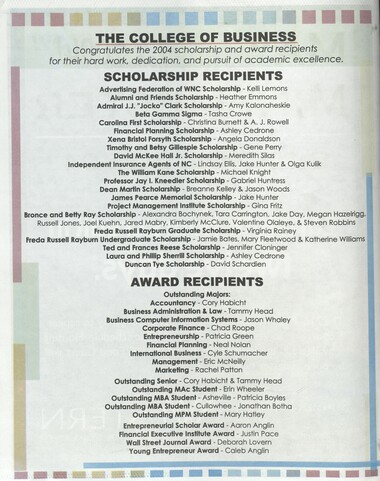
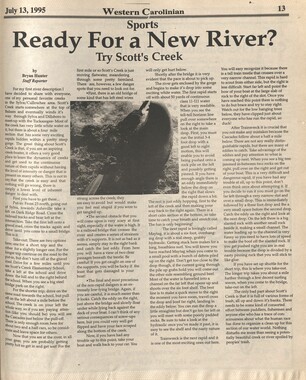
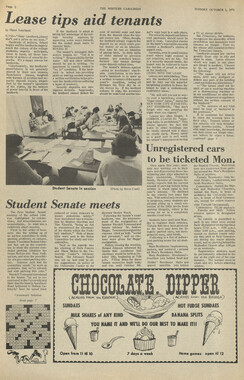
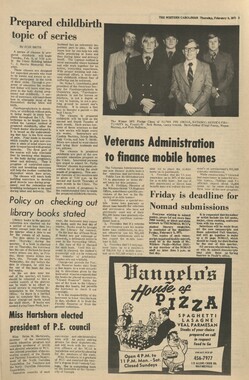
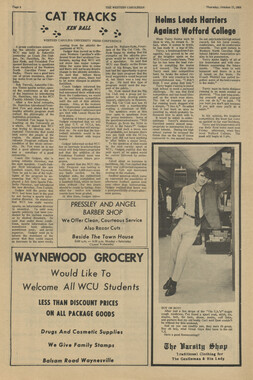
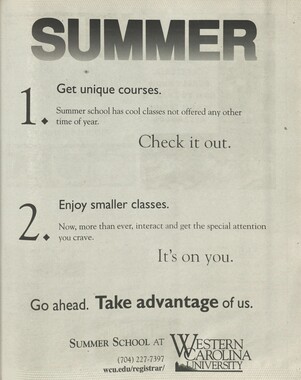
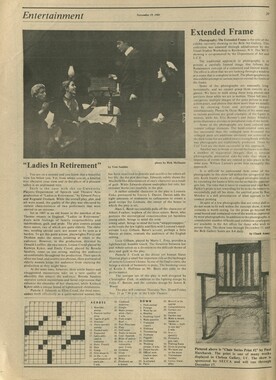
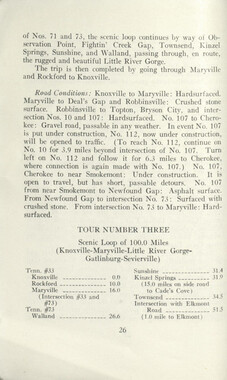

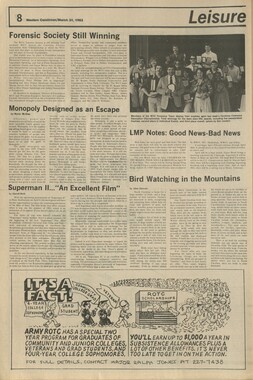
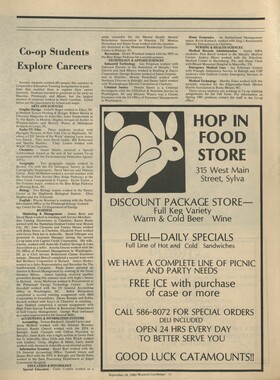
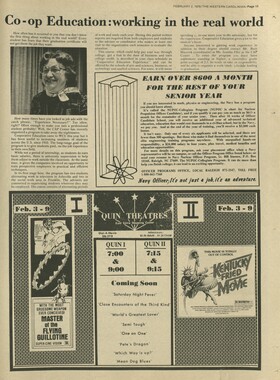

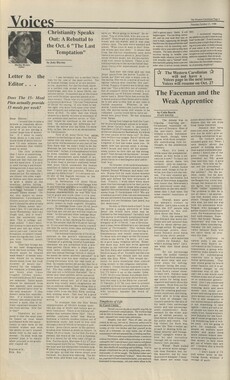
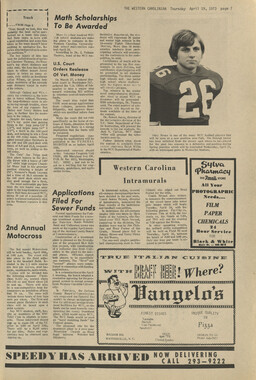
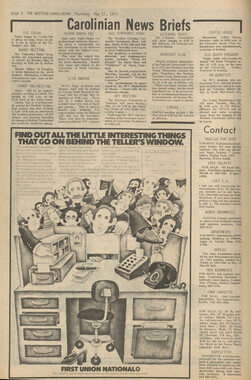
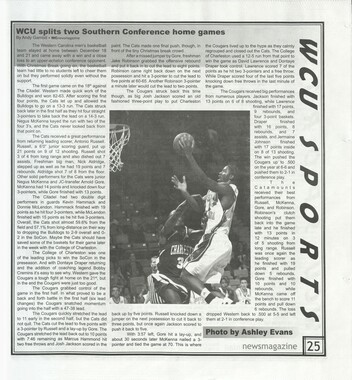

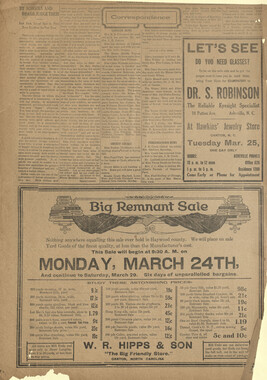
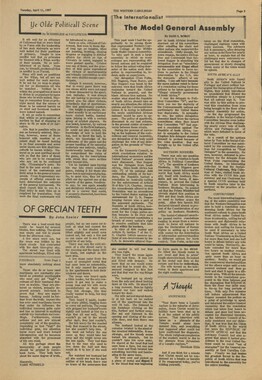
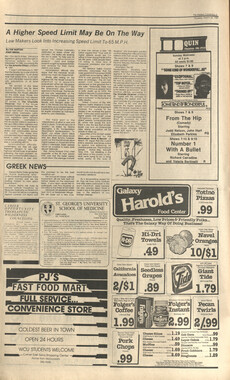

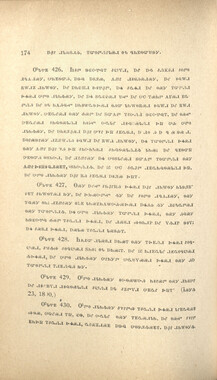
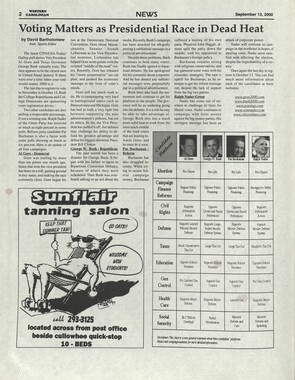


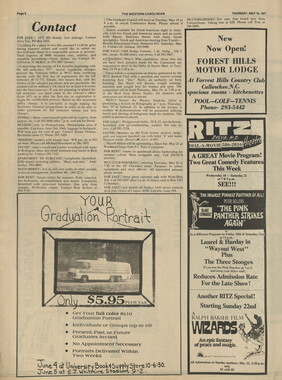
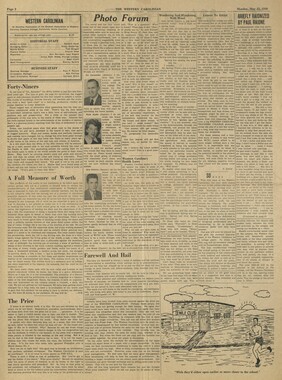
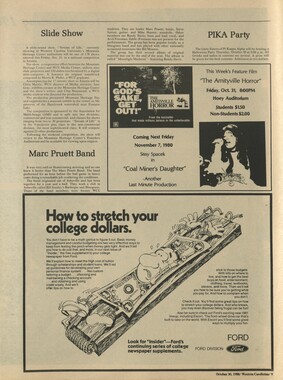
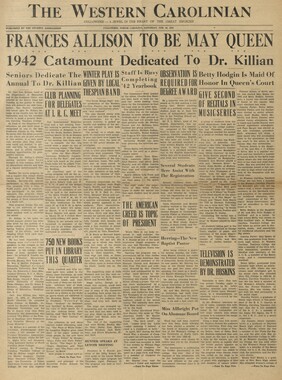
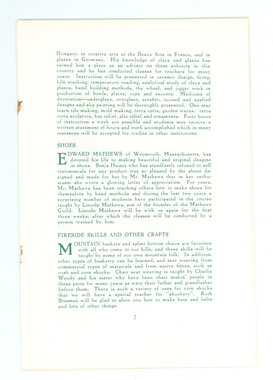
![hl_westerncarolinian_2008-09-26[10-27]_vol74_no03[04]_08.jpg](/media/w400h300/wcu_publications/hl_westerncarolinian_2008-09-26[10-27]_vol74_no03[04]_08.jpg)
